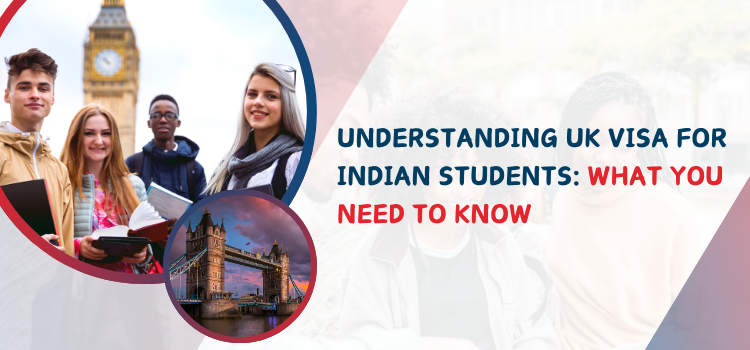
Understanding UK Visa for Indian Students: What You Need to Know
- Aug 29, 2024
- | 32
The United Kingdom has long been a top destination for Indian students looking to pursue higher education abroad. With its world-renowned universities, diverse cultural experiences, and vibrant student life, the UK offers a unique opportunity for students to broaden their horizons. However, before embarking on this journey, understanding the UK visa requirements is crucial. This guide will walk you through the essential details to ensure a smooth process, whether you're applying on your own or seeking help from study abroad experts.
1. Why Study in the UK?
Before diving into the visa requirements, let's briefly explore why the UK is such a popular choice for Indian students. The United Kingdom hosts several of the world's top universities, such as Oxford, Cambridge, and Imperial College London. These institutions offer a wide range of courses, cutting-edge research opportunities, and a global perspective that is highly valued by employers.
Moreover, the UK provides a multicultural environment where students from all over the world come together. This exposure to diverse cultures not only enhances your learning experience but also helps in personal growth. The UK's rich history, vibrant cities, and scenic countryside add to the overall appeal of studying here.
2. Types of UK Student Visas
When planning to study in the UK, the first step is to determine the type of visa you need. The most common visa for Indian students is the Tier 4 (General) Student Visa, now known as the Student Visa under the UK's new points-based immigration system. This visa allows you to study at a UK institution, work part-time during your studies, and bring dependents under certain conditions.
For short-term courses lasting up to six months, you may apply for a Short-Term Study Visa. However, this visa has restrictions, such as not allowing you to work or extend your stay.
If you are under 18 and wish to study at an independent school in the UK, you will need a Child Student Visa.
3. Eligibility Criteria for the UK Student Visa
To be eligible for a UK student visa, you must meet several criteria. Here's what you need to know:
- Confirmation of Acceptance for Studies (CAS): Before applying for a visa, you must have an offer from a UK educational institution. The institution will provide you with a CAS, a reference number that you'll need to include in your visa application.
- English Language Proficiency: You must demonstrate proficiency in the English language by taking a recognized test such as IELTS, TOEFL, or PTE Academic. Some universities may also accept other forms of proof, like a previous degree taught in English.
- Financial Requirements: You must show that you have sufficient funds to cover your tuition fees and living expenses. The amount required depends on your location and the duration of your course. For instance, if you're studying in London, you'll need to show more funds compared to other regions.
- Immigration Health Surcharge (IHS): As part of your visa application, you'll need to pay the IHS, which allows you access to the UK’s National Health Service (NHS) during your stay.
4. Role of Study Abroad Experts
Navigating the UK student visa process can be complex, which is why many students opt to seek help from study abroad experts - IRA Assured. These professionals have in-depth knowledge of the visa requirements, application procedures, and potential challenges. They can guide you through each step, ensuring that your application is complete and accurate, which can significantly increase your chances of success.
In Delhi, for instance, there are several student visa consultants who specialize in UK visas. One such consultant is IRA Assured, known for its expertise in assisting students with their visa applications and admission. A student visa consultant in Delhi can provide personalized advice, help you gather the necessary documents, and even prepare you for interviews. Their experience with the UK visa system can be invaluable in avoiding common pitfalls and delays.
5. Common Challenges and How to Overcome Them
While the UK student visa process is generally straightforward, some challenges can arise:
- Financial Documentation: Providing adequate proof of funds is crucial, but it can also be confusing. Make sure your financial documents are in the correct format and cover the required period. If in doubt, consult a professional for guidance.
- English Language Requirements: If you're struggling to meet the English language requirements, consider taking additional language courses or retaking the test. Some universities also offer pre-sessional English courses to help students improve their language skills before starting their main course.
- Application Timing: It's important to apply for your visa well in advance. The UK visa process can take several weeks, especially during peak times. Applying early ensures that you have enough time to handle any unforeseen issues.
6. What to Do After Receiving Your Visa
Once you've received your UK student visa, there are a few important steps to take:
- Travel Arrangements: Book your flight and make travel arrangements. Remember to arrive in the UK within the validity period of your vignette.
- Accommodation: Arrange for accommodation before you arrive. Many universities offer on-campus housing, but you can also explore private options.
- Prepare for Life in the UK: Familiarize yourself with the UK's customs, laws, and culture. Understanding local etiquette and regulations will help you settle in more quickly.
7. Post-Study Work Opportunities
One of the major benefits of studying in the UK is the opportunity to work after graduation. The UK government has introduced the Graduate Route, enabling international students to remain in the country for up to two years (or three years for those with a doctoral degree) after finishing their studies. This time allows you to gain valuable work experience, significantly boosting your career prospects.
Conclusion
Understanding the UK visa requirements is a crucial step in your journey to study in the UK. By following the guidelines outlined in this blog, you can navigate the process with confidence. Whether you're applying on your own or seeking help from study abroad experts or a student visa consultant in Delhi, careful preparation and attention to detail will increase your chances of a successful application. The UK offers a wealth of opportunities for Indian students, and securing your visa is the first step toward making the most of them.





